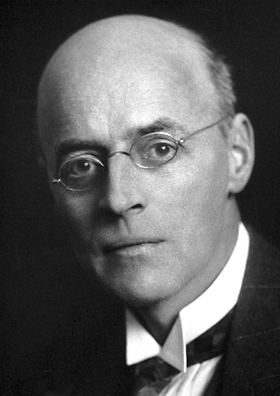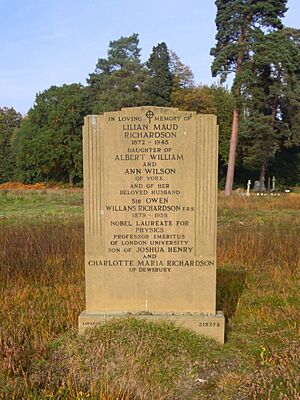Owen Willans Richardson facts for kids
Quick facts for kids
Sir Owen Richardson
|
|
|---|---|

Richardson in 1928
|
|
| Born |
Owen Willans Richardson
26 April 1879 Dewsbury, Yorkshire, UK
|
| Died | 15 February 1959 (aged 79) Alton, Hampshire, England
|
| Nationality | British |
| Education | Batley Grammar School |
| Alma mater | |
| Known for | Richardson's law Einstein–de Haas effect |
| Awards |
|
| Scientific career | |
| Fields | Physics |
| Institutions | |
| Doctoral advisor | J. J. Thomson |
| Doctoral students |
|
| Signature | |
Sir Owen Willans Richardson (born April 26, 1879 – died February 15, 1959) was a British physicist. He won the Nobel Prize in Physics in 1928. He received this award for his important work on something called thermionic emission. This work led to a scientific rule known as Richardson's law.
Contents
About Owen Richardson
Owen Richardson was born in Dewsbury, a town in Yorkshire, England. He was the only son of Joshua Henry and Charlotte Maria Richardson. Owen went to Batley Grammar School and then studied at Trinity College, Cambridge. There, he earned top honors in Natural Sciences. Later, he received a DSc degree from University College London in 1904.
Early Research and Discoveries
After finishing his studies in 1900, Owen began his research at the Cavendish Laboratory in Cambridge. He studied how electricity is given off by hot objects. In October 1902, he became a fellow at Trinity College.
In 1901, he made a big discovery. He showed that the electric current coming from a heated wire depended on how hot the wire was. The hotter the wire, the more electricity it would give off. This relationship followed a special mathematical rule. This rule became famous as Richardson's law. It helps explain how electrons "boil off" a hot surface, which is called thermionic emission.
Teaching and Later Life
From 1906 to 1913, Richardson was a professor at Princeton University in the United States. In 1914, he returned to the UK. He became the Wheatstone Professor of Physics at King's College London. He later became the director of research there.
In 1927, he took part in an important meeting called the fifth Solvay Conference on Physics. This meeting brought together many famous scientists in Belgium. Richardson retired in 1944 and passed away in 1959. He is buried in Brookwood Cemetery.
Other Scientific Work
Besides his work on thermionic emission, Richardson also studied other areas of physics. He researched the photoelectric effect, which is how light can make electrons jump off a material. He also looked into the gyromagnetic effect, which connects magnetism and how things spin. His work also included studying how electrons are given off by chemical reactions, soft X-rays, and the light spectrum of hydrogen.
Family Life
In 1906, Richardson married Lilian Wilson. Her brother, Harold Wilson, was also a physicist and a colleague of Owen's. Owen and Lilian had two sons and one daughter. Interestingly, Owen's own sister married an American physicist named Clinton Davisson. Clinton Davisson was one of Richardson's PhD students at Princeton and also won a Nobel Prize in 1937. After Lilian passed away in 1945, Owen married Henriette Rupp, who was also a physicist, in 1948.
Owen's son, Harold Owen Richardson, also became a nuclear physicist. He was the chairman of the Physics Department at Bedford College, London University. Later, he became an emeritus professor at London University.
Awards and Recognition
Owen Richardson was recognized for his important contributions to science. In 1913, he was chosen as a Fellow of the Royal Society (FRS). This is a very high honor for scientists in the UK. In 1920, he received the Hughes Medal.
His most famous award was the Nobel Prize in Physics, which he won in 1928. He received it "for his work on the thermionic phenomenon and especially for the discovery of the law named after him." This means his research on how hot objects release electrons, and the rule he found, were very important. In 1939, he was made a knight, which means he could use the title "Sir."
Images for kids
See also
 In Spanish: Owen Willans Richardson para niños
In Spanish: Owen Willans Richardson para niños
 | Stephanie Wilson |
 | Charles Bolden |
 | Ronald McNair |
 | Frederick D. Gregory |






